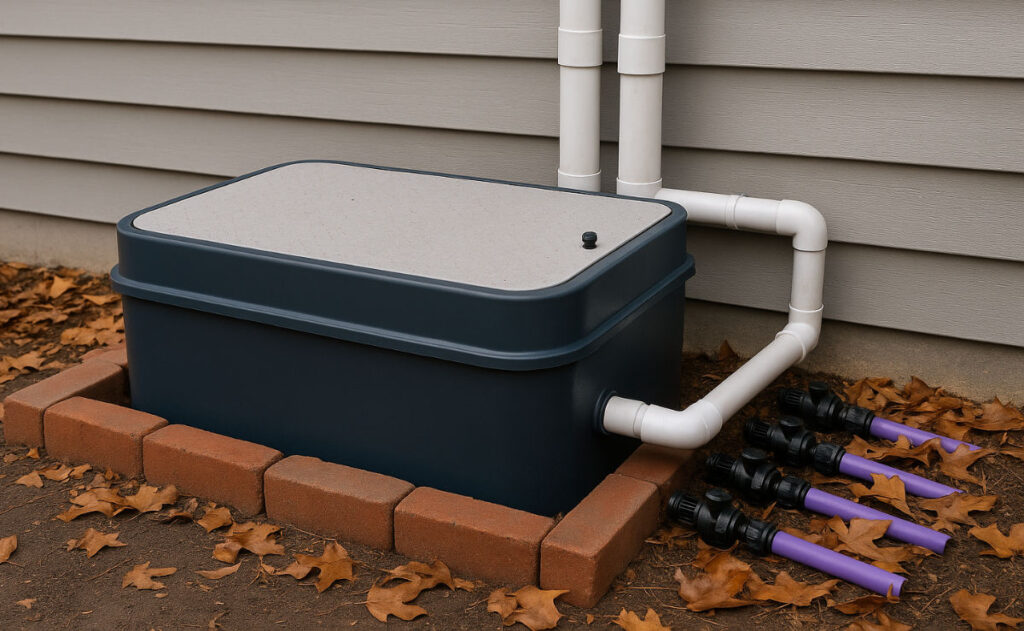In Seattle, we may be known for our rain, but that doesn’t mean water conservation should take a back seat. As the population grows and summers bring drier stretches, making the most of every drop of water becomes more important.

One smart way to do that is by reusing greywater. Instead of sending lightly used water straight down the drain, homeowners can put it to work in their yards and gardens. Greywater reuse for irrigation is practical, eco-friendly, and surprisingly easy to set up with the right system.
What Exactly Is Greywater?
Greywater is the relatively clean wastewater from everyday activities like showers, bathroom sinks, washing machines, and tubs. It’s not drinking water, but it’s also not heavily contaminated like what comes from toilets, which is considered “blackwater.”
This makes greywater an ideal candidate for reuse. With the right system in place, you can safely divert it to irrigate trees, shrubs, and lawns. It’s a way of recycling water that would otherwise go straight into the sewer system, helping households in the Seattle Metropolitan area conserve resources while keeping landscapes healthy.
Why Greywater Reuse Matters in Seattle
Seattle may not be a desert city, but summer water demand here can still put stress on local supplies. Using greywater for irrigation helps reduce reliance on treated municipal water for tasks that don’t require it. Your garden doesn’t need drinking-quality water, it just needs enough moisture to thrive.
The benefits of reuse go beyond saving water. Greywater systems also ease the load on sewer infrastructure and help keep more treated water available for critical uses. When you add in the fact that our region values sustainability, greywater reuse fits right in with Seattle’s eco-conscious mindset.
Types of Greywater Systems
There’s no one-size-fits-all approach to greywater reuse. Systems can range from simple manual setups to more advanced, automated ones. Here are some common types:
- Laundry-to-Landscape Systems: These systems divert washing machine water directly into the yard, often using flexible tubing to irrigate trees or shrubs.
- Gravity-Fed Systems: Using natural slope, water flows from showers or sinks through a filter and into garden areas without pumps.
- Pump Systems: For homes without the right slope, pump systems move greywater into irrigation lines, making them more versatile for Seattle’s hilly neighborhoods.
- Constructed Wetlands: These are eco-friendly filtration setups where plants and soil naturally treat greywater before it’s reused.
The system you choose depends on your property layout, budget, and how hands-on you want to be with maintenance.
Benefits of Greywater Irrigation
When we talk about reusing greywater, it’s about more than saving money on the water bill. The ripple effects are bigger than most people realize.
- Water conservation: By reusing household water, you reduce demand on the municipal system.
- Lower bills: Less reliance on tap water means monthly savings that add up.
- Healthier plants: Greywater often contains nutrients like nitrogen and phosphorus, which act as natural fertilizers.
- Environmental impact: Recycling water lowers the energy needed for treatment and distribution.
- Resiliency: During dry months or restrictions, having a greywater system gives you more flexibility for watering.
It’s a win for your wallet, your yard, and the planet all at once.
Rules and Guidelines in Seattle
Like many environmentally friendly practices, greywater reuse comes with rules to make sure it’s safe and effective. Seattle building codes and Washington State regulations outline how systems can be designed and installed.
In general, untreated greywater can only be used for subsurface irrigation, meaning it must go directly into the soil and not be sprayed where people or pets might come into contact with it. Systems must also avoid runoff into storm drains or neighboring properties.
This is where working with licensed plumbers makes a big difference. They’ll ensure your setup is code-compliant, safe, and suited to your property. By following the guidelines, you can enjoy the benefits of greywater without worrying about potential issues.
How to Use Greywater Safely
Not all water in your home should be reused, and not all plants respond the same way to greywater. Here are a few safety tips:
- Only use biodegradable, plant-safe soaps and detergents to avoid harming soil or plants.
- Avoid reusing water that contains harsh chemicals, bleach, or strong cleaning agents.
- Direct greywater to ornamental plants, shrubs, and trees rather than edible crops unless it’s treated.
- Spread irrigation evenly to prevent soggy spots that could attract pests.
- Maintain your system with regular checks and cleaning of filters to ensure smooth operation.
With these precautions, greywater becomes a reliable and safe way to keep your garden green.
Is Greywater Right for Your Home?
Not every home is set up perfectly for greywater systems, but many can benefit from them with a few adjustments. If you have a yard with thirsty landscaping, a family that runs frequent laundry loads, or a desire to lower your water footprint, it’s worth exploring.
Seattle plumbers who specialize in eco-friendly plumbing can assess your home’s layout and help you decide what type of system makes sense. Sometimes even a small, simple system can make a noticeable impact on water use.
Greywater reuse isn’t about living off the grid. It’s about making smarter choices with resources we already have. For homeowners who want to save water and protect the environment, it’s a solution that fits right into the Seattle lifestyle.
Thinking of Setting Up a Greywater System? Gene Johnson Can Help!
Greywater reuse may sound complicated, but with the right guidance, it’s surprisingly achievable. The key is working with professionals who understand both plumbing systems and Seattle’s specific building codes. That way, your system is safe, reliable, and designed to last.
At Gene Johnson Plumbing, Heating, Cooling, and Electrical, we’ve been helping Seattle families make smart choices about water use since 1976. Our licensed plumbers are happy to walk you through your options, explain what works best for your home, and handle the installation with care. Call us today at 206.792.7495 to learn how we can help you save water while keeping your yard green.





